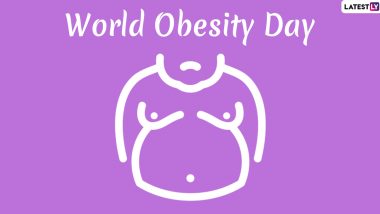World Obesity Day 2019 is observed today, October 11. The day aims at creating awareness about one of the deadliest non-communicable health issues that is growing at a fast pace. Obesity means to have unhealthy body weigh more than normal. A BMI (Body Mass Index) that can cause health hazards to you. Clinically, obesity is defined as a chronic medical condition characterised by too much body fat. The statistics that surround obesity are not good. According to the WHO, 1.2 billion people worldwide are officially classified as overweight and India is just behind the US and China in this global hazard list of top 10 countries with the highest number of obese people, as per a Lancet study. The major causes behind obesity are excessive junk food, alcohol and an overall sedentary lifestyle.
Depression
Obese people may be at increased risk of depression. A research says that even in the absence of other health problems, excessive weight can trigger depression. The research, published in the International Journal of Epidemiology, showed that the psychological impact of being overweight causes depression.
Infertility
Excessive weight gain can cause irregular or infrequent menstrual cycles that can lead to an increased risk of infertility. Less success with fertility treatments, increased risk of miscarriage and other hormonal issues that can lead to infertility are some of the results of infertility. Obesity also increases the chances of high blood pressure and diabetes during pregnancy.
Liver Diseases
Obesity impacts liver health in adults and young kids alike. According to new research conducted by the Columbia University Medical Center, weight gain may have a negative impact on liver health.
Sleep Disorders
Weight and sleep disorders like sleep apnea are interlinked. It is a vicious cycle, as per studies, insufficient sleep can lead to weight gain, which can lead to a serious problem called sleep apnea and cause further sleep deprivation.
Heart Diseases
Heart diseases and obesity is interlinked. Obesity may play a much larger role for the young people who die from sudden cardiac arrest. It has been found that intake of high dietary saturated fats led to an increase in serum total cholesterol and LDL cholesterol. This paves way for increased risk of cardiovascular disease.
High Blood pressure and cholesterol levels
People who are obese are highly associated with high blood pressure. The fat-produced leptin and angiotensinogen causes a high blood pressure by interfering with the natural process of sodium excretion.
Gall Bladder Disease
Obesity is known to affect the normal function of the sac under the liver and the gallbladder. This affects the gallbladder functions adversely. In fact, weight loss is one of the ways to deal with gallbladder issues.
You must follow a balanced diet, and it should be a healthy mix of proteins, carbohydrates and fats. Your diet must consist of a healthy portion of fruits, vegetables, whole grains, legumes, low-fat dairy, nuts to take care of minerals, vitamins, antioxidants, fibre and probiotics that are more and more natural. A combination of a healthy diet, exercise, yoga and a healthy mind can help you get rid of obesity or excessive weight.
(The above story first appeared on LatestLY on Oct 11, 2019 08:30 AM IST. For more news and updates on politics, world, sports, entertainment and lifestyle, log on to our website latestly.com).













 Quickly
Quickly




















